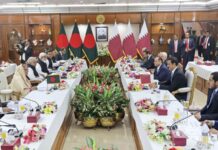Bangladesh youth worried about edu, jobs
 Many of the Bangladeshi educated jobseekers are not provided with employment opportunities due to lack of ‘experience’ as required even for an entry, some youth complained at a Prothom Alo roundtable on Sunday.
Many of the Bangladeshi educated jobseekers are not provided with employment opportunities due to lack of ‘experience’ as required even for an entry, some youth complained at a Prothom Alo roundtable on Sunday.
This indicates the employers especially those in the private sector, are not satisfied with their academic education as some stakeholders called for revising education policy.
The country may enter into an unrest unless adequate employment opportunities are created for more than two million youth who come to job market every year, according to a survey conducted by Institute of Informatics and Development (IID).
Covering 11,658 youth in 23 districts, it shows 84 per cent of the youth calls unemployment as the main problem in the country, said IID chief executive Sayeed Ahmed.
The youth, present at the roundtable, lamented that they are asked to mention their experience while applying for a job when they are just freshers.
The Bangla daily Prothom Alo, in association with IID’s youth network Youth for Policy, organised the roundtable titled ‘Youth Employment and the 4th industrial revolution’ at its Kawran Bazar office.
“Our academic education is of little use in the job market. After completion of graduation, it takes 2-3 years to study various subjects to sit for examination for jobs,” Noyon Kumar Gayen, a volunteer of Youth for Policy, said.
Andrila Nazneen, another volunteer, said, “I need experience if I want to drop my CV for jobs. I’m a fresher where shall I get the experience from unless you provide me with opportunity first?”
She insisted that there should be an arrangement of training and small works during the graduation process.
The IID chief executive recommended a national debate on education policy and said academicians, private sector representatives, the civil society and youth should give their opinions.
Aliva Rani Sheel, another volunteer of Youth for policy, said, “Our education system is result-oriented. If we don’t adapt to new technology, we’ll lag behind.”
Mehedi Hasan of the same organisation said his family did not support him when he wanted to do something during his graduation.
“Experience is required if I want to apply for jobs. But I don’t have it, nor can I attain it within a short time,” he said.
Expert at National Curriculum and Text Book Board Azizur Rahman said the government is going to introduce technology-based textbook to adapt with the advance technology.
“We’ve already launched e-learning at 640 schools on pilot basis,” he added.
Abul Kashem Khan, a former president of Dhaka Chamber of Commerce and Industry (DCCI), said, “We need to change our education system.”
The education that has been imparted to the students has no future and this education has no value in other countries as well, he said adding. “We are at the bottom in the global competitiveness index.” Bangladesh ranks 118th out of 125 in the index, Kashem said.
He suggested making English as medium of technology education mandatory in the education system.
Out of 2.4 million new job entrants a year, Bdjobs.com chief executive officer AKM Fahim Mashroor regretted, 2 million jobseekers become hopeless finding no jobs.
“Our policymakers have failed to address this problem,” he said.
He asked the youth not to depend on their institutions for creating or providing opportunities and insisted that they would have to try to do ‘something on their own’.
Dwelling on the 4th industrial revolution through use of artificial intelligence at workplace, Mashoor said there will be higher demand for ‘higher skills’ and ‘lower skills’. “But there will be a crisis of jobs for those who have mid-level skills,” Mashroor added.
Prothom Alo associate editor Abdul Quayum moderated the session.









